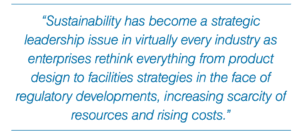New Challenges Ahead for Renewable Energy, Clean-Tech and Sustainability Sector Leaders

May 24, 2021 – Over the last decade, clean technology, solar and electric energy, and sustainability have moved from the periphery to the center of the global economy. Established and emerging companies, along with private equity and venture capital firms, are making massive investments across the field as they stake out expanding areas of the market.
This has driven demand for a new breed of leadership, according to a new report from Russell Reynolds Associates. Among
the search firm’s new research are tips for identifying and hiring leaders in clean-tech, new energy, and sustainability. “Governments have made sustainability and the technology needed to achieve it a key component of both environmental policy and economic development,” said the search firm. “The question no longer is whether this trend will take hold but rather when large markets will coalesce, and which technologies and companies will prevail. Current global economic conditions and gyrating energy prices have made operating and investment conditions challenging in the short run, but industry players nonetheless are moving to capture mind share and press their speed-to-market advantage.”

Strategic Leadership Issue
The influence of clean-tech, energy, and sustainability extends beyond the diverse array of companies focused on this market space. “Sustainability has become a strategic leadership issue in virtually every industry as enterprises rethink everything from product design to facilities strategies in the face of regulatory developments, increasing scarcity of resources and rising costs,” said the search firm. “Forward-thinking companies are appointing chief sustainability officers to proactively address these issues and turn them into opportunities for growth.”
According to the Russell Reynolds Associates’ report, identifying and hiring clean-tech, energy and sustainability leaders to meet this growing demand are complicated by two factors:
1) The nascent state of the industry means there are very few senior executives already within the sector who have a proven track record at scale.
2) The hybrid nature of sustainability requires knowledge and experience across a broad range of disparate fields and a unique set of leadership competencies that can be difficult to find in a single individual.
Understanding the Challenges
“Clean-tech companies require proven entrepreneurial leaders who understand the energy business, can navigate rapidly changing markets, and know how to lead the development and commercialization of new technologies and business models,” said the search firm. “But leaders from traditional energy companies may not have had the level of experience working within entrepreneurial environments that sustainable energy organizations require. Likewise, few technology executives with a track record of managing innovation also possess deep familiarity with the energy industry.”
“The same challenge applies in finding sustainability executives for companies in other industries, who must combine an understanding of a specific company or industry, deep knowledge of sustainability issues and the ability to bring and implement the appropriate technologies and perspectives,” it noted.
To find the right leaders, Russell Reynolds Associates says it has developed an in-depth understanding of each client’s unique challenges and objectives. It then structures each search around those requirements. The firm also focuses on the business strategy and the issues to be addressed within the client organization, the industry and functional expertise required in the role, and the competencies needed to implement solutions. “Our proprietary networks cut across all relevant industries and functional areas, enabling us to transcend traditional industry silos and quickly identify and evaluate appropriate candidates from a range of fields,” said the search firm.
Cultural Fit
In addition to skills and experience, cultural fit plays an increasingly important role in recruiting for clean-tech, energy, and sustainability leadership positions. “A new leader, of course, must fit well within the unique culture of the hiring organization, but he or she also must align well with customers and influencers in the markets that the organization seeks to serve,” said the report.
For example, an archetypical technology entrepreneur who appears perfect to lead a fast-paced, technology-oriented start-up may
not be effective relating to senior executives at traditional utility companies. “The importance of cultural fit holds true whether the recruiting organization is a largescale traditional enterprise seeking to adopt meaningful sustainability initiatives to meet consumer, stakeholder and regulatory expectations or if it is a technologically driven, entrepreneurial organization racing to supply the global market with alternative forms of energy,” said the report.
As a result, Russell Reynolds Associates’ executive assessment specialists are an integral part of the firm’s search teams, providing leadership and cultural assessment offerings that evaluate leaders’ competencies and behavioral traits, the culture of the organization and the cultural preferences of candidates for leadership roles. “This analysis can provide an added dimension to the finalist candidate evaluation process and often highlights issues to be addressed
in the onboarding of the selected candidate, thus increasing the ‘stickiness’ and potential impact of leaders taking on the critical roles,” said the search firm.











